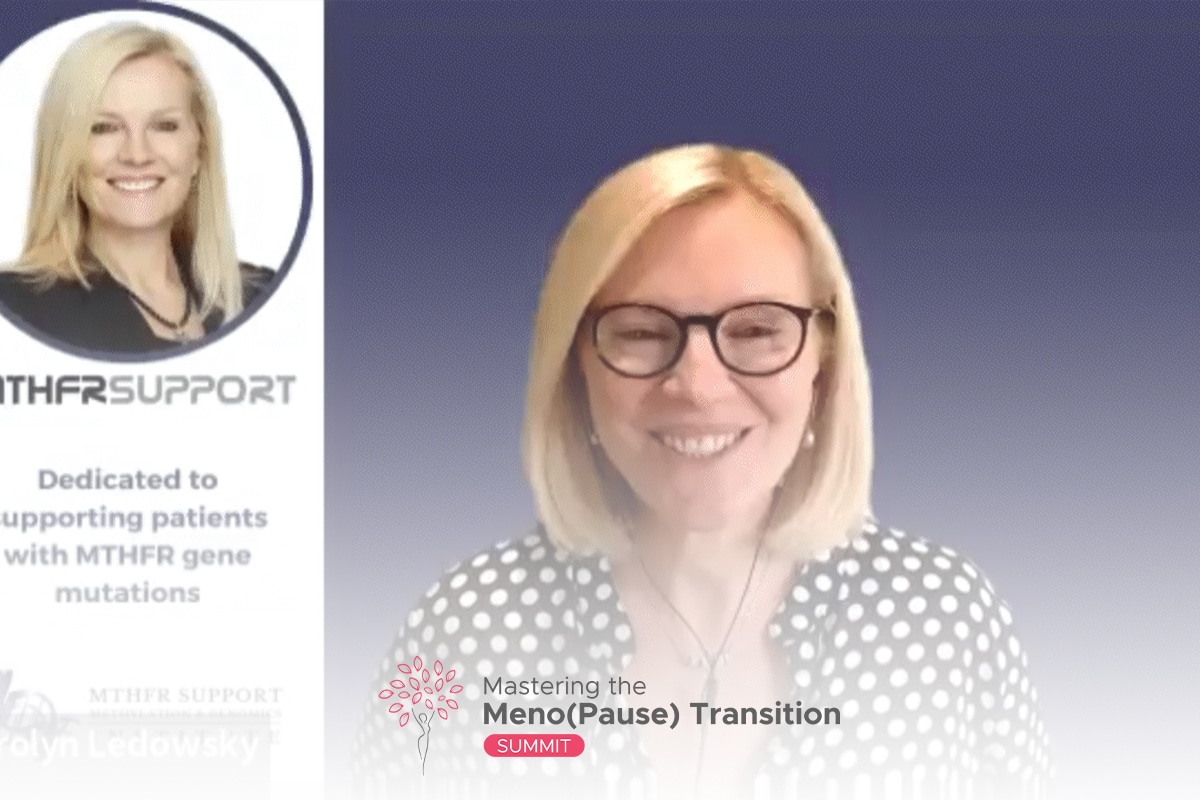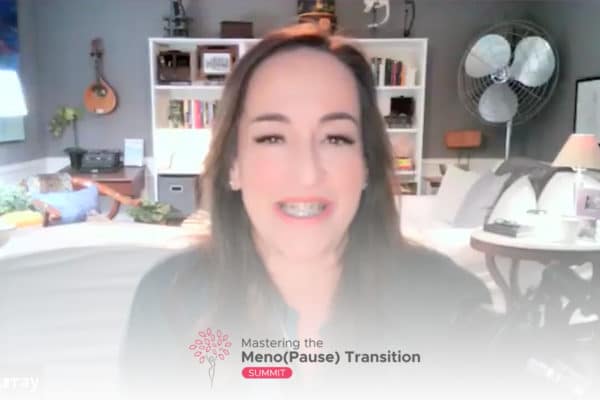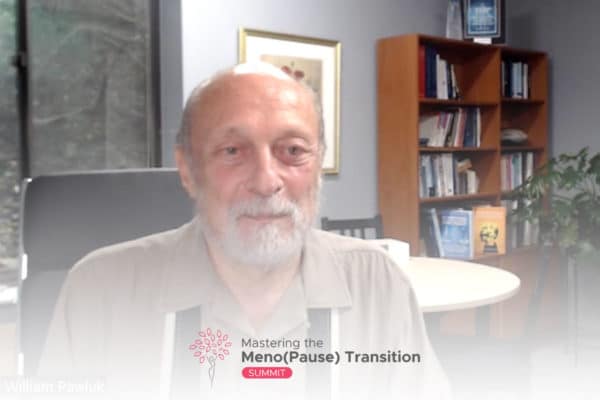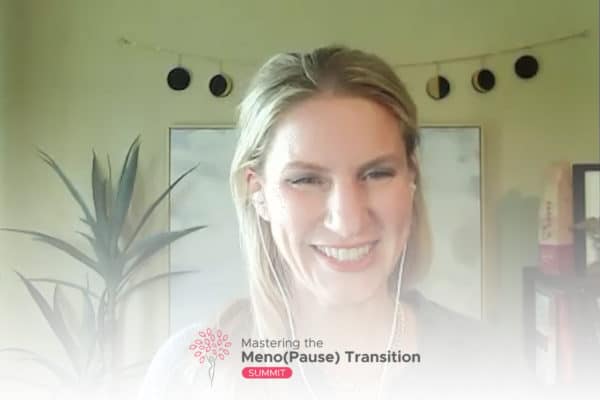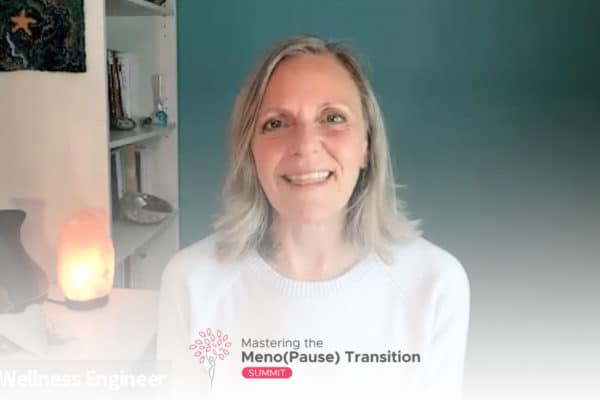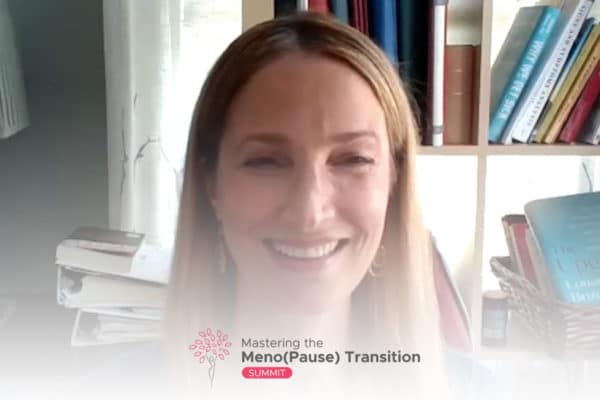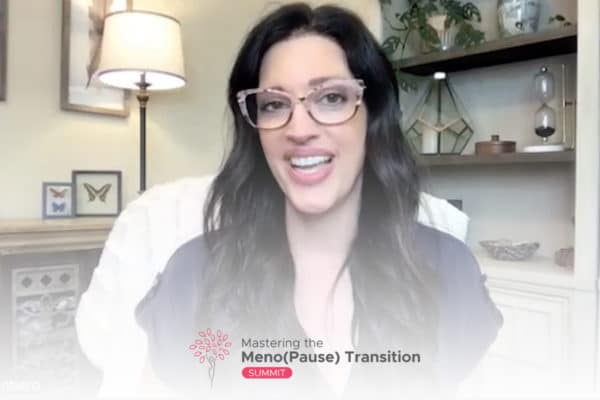Join the discussion below
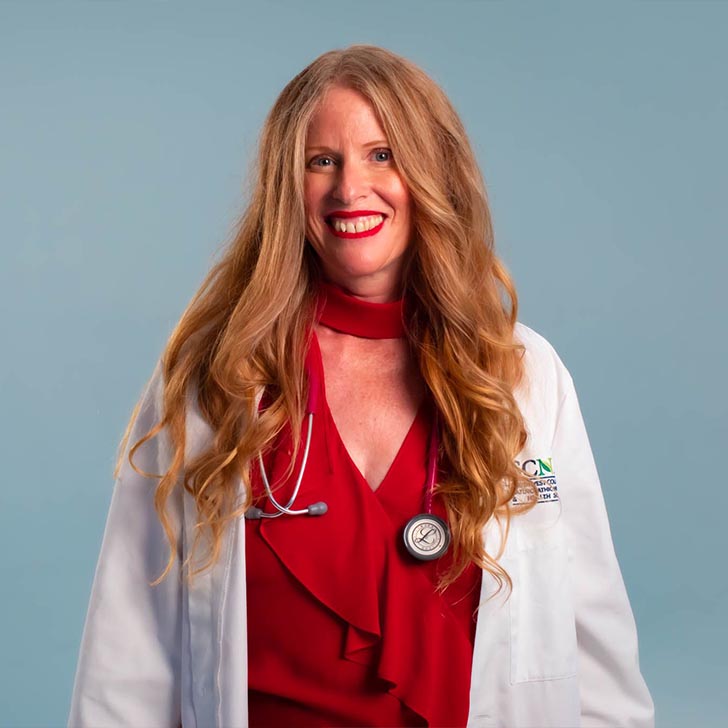
Dr. Sharon Stills, a licensed Naturopathic Medical Doctor with over two decades of dedicated service in transforming women’s health has been a guiding light for perimenopausal and menopausal women, empowering them to reinvent, explore, and rediscover their vitality and zest for life. Her pioneering RED Hot Sexy Meno(pause) Program encapsulates... Read More

Carolyn Ledowsky is the founder of MTHFR Support Australia. She is a Health Scientist, Researcher, naturopath, herbalist, and nutritionist who has a Bachelor of Health Science (Naturopathy) Honours, Bachelor of Herbal Medicine, Bachelor of Naturopathy, Advanced Diploma of Naturopathy and Diploma of Nutrition, and a Bachelor of Economics from Sydney... Read More
- Estrogen dominance does not only happen to women pre-menopausally. Many women post menopause are using HRT but is that right thing?
- Learn who is genetically predisposed to estrogen dominance and why its now affecting as many men as women.
- Estrogen dominance causes weight gain, sleep disturbance, fibroids, fibrocystic breasts, endometriosis, anxiety and depression
Dr. Sharon Stills
Hello, everyone. And welcome back to the Mastering the Menopause Transition Summit. I am your host, Dr. Sharon Stills. And I’ve got a big smile on because I’m super excited for my next guest. We are gonna learn so much about an important topic that you’ve probably heard about, but that we’re really gonna dive deep into with the master. So, I have with me today, Dr. Carolyn Ledowsky. She’s coming to us from Australia, and she is a health scientist, a researcher, a naturopath, an herbalist, a nutritionist, she’s got it all going on. She’s super brilliant, super smart, and she is gonna share her expertise with us today on MTHFR. You can see it right there. She is all about the MTHFR gene, and mutations, and what it means, and how you can work with it if you have it, and what you need to do. So, I’m just thrilled to have this conversation with you today. Thank you so much for coming and being here with us.
Carolyn Ledowsky
Thank you so much for inviting me. It’s my favorite topic in the world to talk about.
Dr. Sharon Stills
Yay. So, I guess, before we dive into all the science and all the juicy stuff, I’d love to just hear, how did it become your favorite topic? Is there a story behind that?
Carolyn Ledowsky
There is a bit of a story. Yes. And I, 12 years ago, it started, and I’m a real stickler for understanding blood work. And so, I used to check bloods. I check folate, check B12. And I used to see half of my population had a high B12. So, I. Sorry, high folate. So, I contacted the lab and I said, “What’s the significance of this high folate?” And everybody that I spoke to said, “You know what? That’s a great thing. It means they’re having a lot of leafy green vegetables.” And I thought, “No. Actually, they’re not.” I know my patients and they’re not at all. So, it took me maybe six months researching, I couldn’t find the answer. And I was at a conference in Adelaide and a doctor happened to mention that the MTHFR gene was associated with high folate in the blood. And I thought, “Uh oh. That’s the answer I wanted.”
So, I made a bee line for this presenter after the conference and said, “Okay, tell me what MTHFR is.” And she said, “Look, it’s the gene that controls folate. Just Google it. You’ll find some research.” And I did. And it became an absolute obsession. Because what was really interesting is if I changed the form of folate these people were having, their blood folate levels came down and they started to feel better. And I’m thinking, “Oh, there’s really something in this.” And I also started to see patterns with their family history. So, there was often a family history of miscarriage. There was often a family history of mental health. And more than likely, a family history of cardiovascular disease. So, I thought, “Oh, okay.” And then this got me into, not only folate, but then to understand the other genes in the methylation cycle. And so, now, my real forte is genetic susceptibility. Looking at a patient’s susceptibility. Where do they fall down? And then environmentally, what influences those genes more to stop them recovering and getting to good health?
Dr. Sharon Stills
Hm.
Carolyn Ledowsky
And that’s a real, like, that is getting to the absolute root cause.
Dr. Sharon Stills
Hm. Which is what we are all about. So, let’s just dive in and I love, I could really relate when you see something and you just become obsessed with it. And then you see someone talking about it and you’re like, “I need to talk to you. I need to know.”
Carolyn Ledowsky
Exactly, exactly. My husband… You know what? I believed in this so much, in the space of one week, I literally changed. I decided I’m gonna change the name of my business to MTHFR Support Australia. My husband thought I had seriously lost it. He said, “Who on earth is going to come to a place named after an obscure gene that no one knows anything about?” But much to my excitement, the patients were way ahead of us. I quadrupled my business within the space of three months. And I now have 10 practitioners doing this whole gene susceptibility methylation all day, every day. Like, because patients want it. They wanna know. You know, if they. ‘Cause they see someone have the same condition as them and they improve and they don’t, and they go, “But how come? I was given the same supplements. I had the same problems. They’re better and I’m still struggling.” And I think that’s where it becomes so powerful. So, I do a lot of practitioner education too. Because I believe that every practitioner on the planet should be doing this to be able to look at someone’s, you know, family history and say, “Well, we don’t want you to end up with cancer,” or “We don’t want you to end up with endometriosis,” or whatever it happens to be. So, how do we stop it? And understanding where your genetic susceptibility is is a 1000% the way that you stop it.
Dr. Sharon Stills
Exactly. What do we say? Genes load the gun, but the epigenetics pull the trigger. And so, the more knowledge we have and the more we know, the better our health outcomes are gonna be. So, oh, I’m so excited. Where do we get started? I guess, let’s just do some definitions for everyone watching just to make sure we’re all on the same page. What is MTHFR? What is methylation? You hear methylation so often.
Carolyn Ledowsky
Yes.
Dr. Sharon Stills
But I often wonder if people really know what it means.
Carolyn Ledowsky
Methylenetetrahydrofolate reductase So, MTHFR is just the enzyme that takes folate, the folate you eat, and we’re particularly talking about folic acid. Can I actually, I will take a step back and just say, it’s really important that people understand that there are different forms of folate before we even get started. Because there’s folic acid and that’s made in a lab, it doesn’t exist in our body. It’s manmade. It’s a form that they fortify food with. Now, the important thing to remember and know about folic acid is unless your body genetically can use it, it’s a waste of space. And the other thing to remember, which is part of my PhD project at the moment, is to really understand if we are getting too much because of the supplementation. Because in the U.S. and in Australia, we fortify foods with folic acid. And we’re only meant to get a little pinch of it. But we’re getting so much now, the theory is we’re actually inhibiting our good folate pathway.
So, we’ve got folic acid. We’ve then got folinic, which is a metabolically active form, but the only biologically active form. Which means this is the form the body uses for fertility and health, mental health, and detox is methyltetrahydrofolate, hence the MTHFR. It’s methyltetrahydrofolate reductase. So, it’s the enzyme that takes that folate and makes our biologically active methyl folate. Now, methylation, however, is just… A methyl group is a carbon and it’s surrounded by three hydrogen atoms. It has one arm that is left open. And that open arm is meant to grab onto amino acids and proteins, and actually allow the body to do what it needs to do. So, these little methyl groups, they’re floating around our body and we use them a hundred million times a second.
Stress is one of the things that uses methyl groups more than anything. So, our methyl folate donates its little methyl group into where we need it, and then it’s recycled again and we make it again. So, the important thing is we have to be, not only making methyl folate, but we have to be recycling it and utilizing it ’cause it does everything. It supplies, you know, SAMe, so we can make creatine for our muscles and our brain glucose. It helps us detoxify toxic estrogens, which really does become a big problem during menopause. It also allows us to create phosphatidylcholine for our brain functions so we can remember things. It also helps us break down histamine so that we don’t break. You know, we don’t have a lot of histamine reactions. And as you know, Sharon, so many people have histamine problems.
Dr. Sharon Stills
Mm-hmm.
Carolyn Ledowsky
So, these little methyl groups, and that when we say methylation, it’s our ability to make them and use them. That’s what methylation means.
Dr. Sharon Stills
Wonderful. Thank you. Thank you. That is very clear and very helpful. So, just going back to the folic acid. So, if someone. What are your thoughts, for the ladies listening, on supplementation? Should they be taking folic acid? Should everyone just take 5-methyltetrahydrofolic acid because you’re just gonna assume they need the activated form? How does that? How do you… What are your views on that?
Carolyn Ledowsky
My views are, and particularly because I’m right in the thick of the research right now, I’ve spent so far, you know, three years researching about folic acid and how it’s used, and compared that to methyl folate. And I honestly don’t believe we need it. If we. So, what the research is saying, and what I’m about to do a literature review on, is that if we eat leafy green veggies, which is the good folate, by the way, it doesn’t need to be convert. It is converted in the gut, but it doesn’t need this DHFR enzyme to do it like folic acid. So, if we eat leafy green veggies, we get really good methyl folate, which is great. But people don’t eat enough leafy greens to get the minimum amount we need. So, then you say, “Okay, should we have be having foods with folic acid?” Well, in my clinical experience over the last 12 years, people with MTHFR polymorphisms, which by the way, Sharon, can be up to 55 to 60% of the population, can have some sort of polymorphism. Generally, they don’t feel as well because their problem is they’re methyl deficient.
And so, they really need to encourage, A, eating lots of really good leafy greens. But the research says not many people actually get what they need. So, then the question is you probably need supplementation. But folic acid is not the form to be taking in a supplement. And particularly, ’cause the enzyme that uses folic acid, it only deals with a tiny little bit of folic acid a day. 200 to 300 micrograms max. Then it gets inhibited. Whereas methyl folate, there’s no problem. And so, the researchers say, in the U.S. and in Australia, people are regularly getting above the upper tolerable limit that they think is safe. And so, this buildup of folic acid, it’s now being linked with cancer. It’s being linked with a decrease of natural killer cells. It’s being… Mental health. We also know that this unmetabolized folic acid does cross the placenta, and most babies who are breast fed in a fortified country have levels of unmetabolized folic acid. They did a research study that said 93% of babies have it in their system.
Dr. Sharon Stills
Wow.
Carolyn Ledowsky
Yeah. And that is a big wow.
Dr. Sharon Stills
Yeah.
Carolyn Ledowsky
And I have to say to myself, not only is this potentially a fertility problem, but it is potentially a mental health problem. When the good form of folate that our brain uses is methyl folate, not folic. Folic has to be converted. And this is what I guess a lot of people forget in the argument about folic acid versus methyl. At the end of the day, folic acid can only be used if it’s converted to methyl folate. And so, why would you take something that’s at the top of the chain when we need the bottom?
Dr. Sharon Stills
And most people aren’t gonna convert it. So, for the latest listening, should they be going through their supplements and making sure they’re not taking folic acid?
Carolyn Ledowsky
They should. Yes, they should. Because, and it doesn’t mean that you need a lot. So, we have a prenatal multivitamin that we use as a multivitamin. And the dose for prenatal women is three caps. And we sort of post load for people who have MTHFR and give them more above that. But as a multivitamin, you could take one or two of those a day. And together with your leafy greens, that’s really what you need. In the U.S, you tend to go for really high doses of everything, and you don’t necessarily need them as long as you are feeling good. And what we usually find is those people that get off folic acid and swap to methyl folic, they actually feel an increase in energy, an increase in vitality. Their mood improves. Like, they physically see really good benefits from the swapping, particularly if they have an MTHFR gene polymorphism.
Dr. Sharon Stills
Mm-hmm. But it sounds like even if they don’t have the polymorphism, there’s still gonna be benefit.
Carolyn Ledowsky
That’s what I personally believe, yes.
Dr. Sharon Stills
And you mentioned mental health issues. I’m just curious, is it depression? Is it OCD? Is it all sorts of mental health issues? Or do you see just one sort of issue of–
Carolyn Ledowsky
No. It’s all sorts of mental health issues. But we particularly see lifelong depression when we see a combination of a couple of genes. So, MTHFR homozygous and COMT. So, catechol-O-methyltransferase. COMT gene. If that’s fast, we see usually people saying, “I’ve had depression my whole life and I’ve tried every antidepressant and it just does not work.” So, the combination of supporting dopamine and also methyl folate can be phenomenal, life changing for some people. And they’re now doing really good research studies with using higher dose methyl folate for mental health patients on antidepressants to improve the efficacy. So, and that’s the great thing. Even if someone is on an antidepressant, it can augment and make the results even better. So, it’s not contraindicated if you are on, already, an antidepressant.
Dr. Sharon Stills
So, someone who’s watching who doesn’t know their status. I’m sure they’re thinking right now, “How do I find out?” So, is there… What is the preferred way of finding out if you have this polymorphism? If this is an issue for you?
Carolyn Ledowsky
They can go onto our website, mthfrfertility.com. And in the shop, they can just download. They can just purchase the gene test kit, the MTHFR gene test kit. And they do it at home. It’s a swab test. They send off the kit, the swab, and then it comes back with the result. And so, you can… And look, I really believe, Sharon, that it’s vital for everybody to know whether or not they have a problem in making folate ’cause it is affecting their biochemistry at almost every level. And I think it’s something because it’s so important to our health. It doesn’t matter if you are five or 85, you still need to know if there’s a nutrient that is actually causing you to feel suboptimally.
Dr. Sharon Stills
And it’s something that we were… We’re just like were taught you take your folic acid, right? You’re you’re pregnant. Take your folic acid. It’s kind of, so it’s so opposite of what we have been taught in mainstream.
Carolyn Ledowsky
And that’s exactly why I’m doing the research because I’ve come to this conclusion myself. So, we, I started off testing dosages with my patients 12 years ago. And so, I use higher doses, particularly in preconception and pregnancy because I’m trying to get these women pregnant. But it then got to the stage where none of the doctors were on board because the medical fraternities turn around and say, “This is irrelevant.” But how can, just tell me, Sharon, how can a bio biochemical pathway be irrelevant? It doesn’t make sense. And it’s only irrelevant ’cause they don’t know what it means.
Dr. Sharon Stills
Exactly.
Carolyn Ledowsky
And so I did… I did my first research project, which was a case series. And we took 12 women with diagnosed infertility by medical specialists. They had… We took them all off folic acid. We gave them all methyl folate, or a combination of methyl and folinic. And guess what? We had 11 pregnancies and 10 live births.
Dr. Sharon Stills
Hmm. Wow. Makes so much sense.
Carolyn Ledowsky
And some of these women had had 10 miscarriages, eight failed IVF. I mean, we shouldn’t be even considering anything but methyl folate in preconception and pregnancy when you are getting more and more infertility. There’s 70 million couples with infertility. And yet we say, “Just keep trying.” It’s not the answer.
Dr. Sharon Stills
Exactly. Exactly. So, before I move on, I just wanna go back to the testing. Is it something that could be done in the blood work?
Carolyn Ledowsky
It can be done in the blood work. I believe though, in the U.S., it’s much harder to get it done. Here, it’s easy. Medicare will fund it if someone in the family has actually got an MTHFR polymorphism. But I don’t believe, in the U.S., it’s as easy as that. Maybe you can tell me.
Dr. Sharon Stills
Yeah, ’cause I’ve run it on patients in the blog.
Carolyn Ledowsky
Oh, you have. Okay. Well, then you ask your medical practitioner and they should be able to get it done for you.
Dr. Sharon Stills
Yeah, I think, you know, insurance is always so different. But it’s good to know that they can just get it right from you and no problems, so you don’t have to argue with a doctor who’s not willing to support you in your journey towards health, so. So, let’s talk hormones and MTHFR, And how does this… You know, for the women listening, it’s so important. Because as you’re going through perimenopause and menopause, you may have daughters or nieces who are struggling with infertility. So, this is such important information that we share and pass on just for womanhood throughout the ages and throughout the generations. But for someone who’s passed, wanting to get pregnant, or childbearing, how does MTHFR relate to them as they’re going through perimenopause and menopause? And why should they know and what should they be doing?
Carolyn Ledowsky
Well, I think the key things are, for me, at the estrogen dominance. And I know that you’ve had other people talk about estrogen dominance, but I’ll just say that–
Dr. Sharon Stills
Not from this perspective, so–
Carolyn Ledowsky
Not from the perspective, yes. So, remember, we said, methyl groups are really important and methyl folate makes that, and the MTHFR gene makes methyl folate. If you don’t have enough methylation, you can’t get rid of toxic estrogen. And so, most doctors consider that because someone is no longer menstruating, they can’t have a high estrogen. But it’s actually the opposite. I find that most menopausal women have excess toxic estrogen in their system. And so, what happens is that depletes their good estrogen and they end up with an excessive toxic estrogen, which then predisposes them to all those things that we know postmenopausal women have like fibroids. Not so much endometriosis, but definitely fibroids, and definitely cyst, and definitely breast cancer. And in men, it’s… And they have the same problem. It’s more prostate cancer. So, we need to get estrogen under control. And if methyls are deficient, then you don’t get rid of toxic estrogen.
Dr. Sharon Stills
So, when you say toxic estrogen, I just wanna, are you talking about the metabolites, like a 4-hydroxy or…
Carolyn Ledowsky
Yes.
Dr. Sharon Stills
Okay, so you’re talking about how we’re metabolizing our estrogens.
Carolyn Ledowsky
Correct. Correct. And so, we get, because COMT is so important for that, particularly the 4-hydroxy, you get this excessive… So, they start to get these signs and symptoms of weight gain around the middle. They start to get sleep disturbances. They also, and this is one of the things that I really wanna stress with postmenopausal women is that if you are getting hot flushes, or you say hot flashes, if you are getting hot flashes through through the night, do not assume it’s a lack of estrogen and go onto hormones, hormone replacement. Because a lot of the time, it’s histamine causing your flushing at night, and or sulfur. So, the three things that I think most, most trigger the hot flashes are not estrogen. It’s usually a histamine response because between around about three o’clock in the morning is when we release histamine, and sulfur sensitivity.
So, if you’re taking things like glutathione and methionine and, you know, garlic and all those things that raise sulfur. And you can’t get rid of sulfur, you will flush. You will get hot and you’d think, “Oh, well, I’m having a hot flash,” but that’s actually not the case. So, I think any of the hot flashes, first thing to do is reduce your histamine. Now, why is that? Because histamine needs methyls to clear it. So, you’ve not only got the estrogen causing a problem, but you’ve also got a histamine increase. So, if you’ve had any exposure to mold or you’ve had lime or you’ve got gut bacteria, the chances are you can have histamine being released that is then hard to control. And if you are then genetically not able to clear your histamine, bang. Off goes the flushing.
Dr. Sharon Stills
Wow. Very interesting. So, is the not clearing the histamine going back and related to the MTHFR? Or are we talking about another gene?
Carolyn Ledowsky
Well, it is. No, it is. Because the MTHFR gene makes methyl folate that gives you your methyls to clear histamine.
Dr. Sharon Stills
So, I often say all roads lead home to stress, and stress is such an underlying cause, but I feel like now I can also add to that. All roads lead home to MTHFR issues, it seems like. That it’s so far reaching.
Carolyn Ledowsky
But you are a 100% right in the stress response. Because the more stressed you are, the more you deplete your methyls.
Dr. Sharon Stills
Hm. So, why, I don’t know if you know this, but why is the MTHFR SNP, why is it so prevalent? You said 50, 60% of the population. Do we know why it’s such a large amount of people?
Carolyn Ledowsky
The highest percentage of the homozygous, the two copies of the gene, is actually Mediterranean and Mexican populations. They have the highest. And so, here in Australia, we have a huge percentage of Mediterranean. Not so much Mexican, but you would have a lot of Mexican population in the U.S. And I heard a really interesting podcast that basically said, because our environment is changing, they believe that the MTHFR gene is expressing more, and I’ll explain what that means. And it starts in your mother’s womb. And in actual fact, what they believe now could be three generations along that it actually started. So, let’s say folic acid was introduced in the… Well, here. It was 2006. It was earlier. It was 1998 in the U.S. And slowly but surely, we’re increasing our folic acid intake ’cause almost every food on the supermarket shelf is now fortified. So, instead of getting a little bit, we’re getting a lot. I think that’s one reason. Because we’re ending up to be methyl, folate, or…
Deficient, mostly. Also, stress is increasing. And when you think of our mental stress, our environmental stress, as in the toxins and pollutants we are now exposed to, and our ability for the liver to cope with that, then that’s what we call an epigenetic effect on a gene and it’s actually making it express. So, if mom, let’s take two scenarios. Mom is pregnant. She’s taking methyl folate. She’s getting enough sleep. She’s well supported at home mentally by her partner. She’s got a great job. She exercises. The chances of that child having an expressed MTHFR gene is minimal next to none, even if she’s homozygous. If, however, you take a mom who’s homozygous, she’s taking folic acid. She’s stressed to the hilt. She’s working 14 hours a day. She’s struggling to just, you know, get food on the table because she’s so busy. She’s not exercising. She’s eating crappy food. Then that expression of the gene will be upregulated. And that child will be born with MTHFR gene expressing. And so–
Dr. Sharon Stills
We should be checking this in the little ones.
Carolyn Ledowsky
We should be. Particularly, if you see kids, you know, those terrible twos where kids throw themselves on the floor and, you know, have tantrums and just lose the plot. I look at that as, “Okay. That’s potentially an MTHFR gene we need to address.”
Dr. Sharon Stills
Interesting. Interesting. My granddaughter is too, and she has these very… Very dramatic tantrums. But where she like doesn’t wanna throw herself on the floor, she lowers herself down gently and kinda…
Carolyn Ledowsky
Oh, that’s good. ‘Cause some of them you see them absolutely losing the plot and screaming their heads off. And I think, “Oh, okay, there’s something wrong there. That’s not, that’s actually not normal.” And so, I think we put it down to being normal. But in actual fact, I’ve seen… Do you know what’s the most amazing thing, and it’s just beautiful to see, is when we have what I call an MTHFR baby, right? So, someone’s come in. They’ve had multiple miscarriages. We see. We see people in the U.S. as well ’cause we’re a 100% online clinic. And we’ve had so many women that have had what I call MTHFR babies. So, they’re really well supported with methyl folate. They’ve had a beautiful pregnancy. They may have had six miscarriages before, but they’ve had a beautiful pregnancy. And these babies, they are, I hate to say it, but they are well adjusted. They progress really well. So, they start crawling faster, walking faster. Their brain function is better. By the age of two, they’re fully talking. To see that is absolutely quite phenomenal. And if you put a baby beside at the same age, you would swear that they were nowhere near ages.
Dr. Sharon Stills
I love that you said that because I say that all the time about my granddaughter. I’m proud.
Carolyn Ledowsky
Yes.
Dr. Sharon Stills
But she has crushed every milestone and fully talking before two. And I know that it’s, yeah, she’s smart, but I know this is just a healthy expression. And that our children and not reaching milestones, that it’s an issue. It’s not… It means something’s out of balance. And so, this is such a good piece. So, now, I wanna go back ’cause I have a question still lingering my head. So, you were talking about the toxic estrogens. And I think something that’s really common is, “Oh, if your estrogens aren’t metabolizing properly, take DIM. And that’s just thrown at everyone. But I would like to hear what you think is important to do because DIM is not the be-all end-all answer. And there’s a lot of other things that I think are more important, or definitely equally important.
Carolyn Ledowsky
Yes. I agree. I think looking at the diet is critically important. I’d rather people, you know, put things like flax seeds in. And one of the things that I really look out for is exposure to mold. And I think this is probably one of the most important things. ‘Cause what most people don’t understand is that mold mycotoxins need the glucuronidation pathway to clear. And so, when you see someone who has a very high mycotoxin level, their glucuronidation pathway is jammed, and they become more estrogen dominant. And so, supporting glucuronidation with the likes of calcium D-glucarate, I think, is probably my favorite first thing go-to. And then if someone was, I tend to use the DIM and combination of in DOMS more premenopausally. Because that’s when you need sometimes to go in hard and fast because these women are getting super painful periods, very, very heavy periods. Mood is going. A lot of anxiety. So, you know, you’ve really gotta go in quite hard. So, I’ll probably do all of that. But I think postmenopausally, there’s so many things as you say that you can do. But I think supporting glucuronidation, methylation, and glutathionylation are the three phases that I would preferably go for.
Dr. Sharon Stills
Mm. Can’t forget about glutathione.
Carolyn Ledowsky
No, you can’t.
Dr. Sharon Stills
And so, environmentally, it’s the mold. Are there other things? I remember being a young medical student 25 years ago and one of the doctors saying, “We’re just swimming in a sea of toxic estrogen,” and that always, that term always stuck with me. So, I’d love to hear your thoughts on that.
Carolyn Ledowsky
It’s unfortunately very true. And every credit card receipt you pick up, think of that as something that is going to cause an endocrine disrupting, something or other. So, you know, that’s potentially estrogen. Every plastic water bottle. Every plastic container in a supermarket shelf that you buy your food in. Every personal care product that you touch needs to be clean, sulfate-free, phthalate-free Look on the label. If you don’t understand what’s in it, don’t put it on your body. You know, polysorbate 80, which is in so many personal care products, is a carcinogen. You know, you have, I looked at a thing the other day. It had aluminum in it.
Dr. Sharon Stills
Oh. That’s scary.
Carolyn Ledowsky
So, everything, and they say by time a woman gets up, has a shower, puts her makeup on, and walks out the door, she’s been exposed to over 300 toxic chemicals.
Dr. Sharon Stills
I’ve never–
Carolyn Ledowsky
And so…
Dr. Sharon Stills
Heard that before.
Carolyn Ledowsky
You know, going to a health food shop, what do you… You don’t call them health food shops. What do you call them?
Dr. Sharon Stills
We call it the health food store. We just call it health food–
Carolyn Ledowsky
Health food store. Yes, so something like that. And just by the most simple, basic product you can find. Do you know all I use on my skin, and I’ve only used it for 20 years, is pure 100% rose hip oil. That’s all I put on my skin. And so–
Dr. Sharon Stills
You look lovely.
Carolyn Ledowsky
Thank you. So, it’s really important that we just look at every product that we are cleaning with in our house. Check. Is it, I mean, you can use vinegar and water for most cleaning. You can make your own. There’s great recipes online for making your own products. But whenever you’re buying personal care or makeup, just really check that it’s organic if you can. I think that’s really important. I think another thing that we don’t think about a lot is WiFi. And WiFi exposure in the home can also be very detrimental to ourselves and our detoxification. And particularly kids who have had mold exposure, it can actually make them almost autistic. Having that exposure to the WiFi while they’re in the house if they’ve got mold. So, I think it’s such a shame. People sleeping with power boxes on the outside of their bedroom wall. Things like that are really detrimental to health. And you may well say, “Well, look. You know everything’s a health hazard,” but it almost is. I think 5G is going to be a nightmare. You know, how do we stop 5G, you know, entering our homes other than to have shutters on the outside and lock it up every night? It’s almost impossible. I won’t be buying a 5G-activated phone. I’ll never do that.
Dr. Sharon Stills
Same. Same.
Carolyn Ledowsky
Yeah. I mean, there are just so many things. So, I think clean water, plenty of sleep, eat really well as organically as you can possibly afford to do that. Cleaning products that are clean and natural. Everything that you use in the house. Avoid WiFi. Just, if you have to use wifi, turn it off when you go to bed It’s simple. And obviously, you don’t wanna be living on a highway, a freeway, you know, with lots of pollutants either. If you are, then something like a HEPA filter to help clean the air would actually be really good. So, I think there’s a lot of things that we can do. We just have to be aware of it That’s what we need to do. Right?
Dr. Sharon Stills
Exactly. I think you bring up so many good points. And I just think it can be overwhelming, but if you take it from the attitude with which you’re bringing it is that there are just so many stressors and so many toxins. It’s just the society we’re tapped into right now. This is how it is. And so, being aware and making good choices, and lowering your load for the things that you have the capability. Not getting crazy and anxious about it, ’cause that creates a whole another set of toxins if you’re stressing and anxious about it. But just going about it in a methodical way. Maybe taking your bathroom to start and cleaning out in there. And the other thing I was thinking, ’cause you mentioned with food, that all the processed food has folic acid. So, that really speaks to the benefits of eating non-processed foods for yet another reason. And cooking and shopping, we always say, “Shop the perimeter of the store. Don’t go up and down the aisles where all the box foods are.” And for many reasons, but this is another really important reason is what I’m hearing you say.
Carolyn Ledowsky
A 100%, Sharon. And I tell my patients, “If you want a cake, fine, make your own.” And I like to think that postmenopausally, you know, the kids have left home. You’ve got more time. Like, my daughter and her husband just got COVID. And so, I’ve got a Thermomix. I love my Thermomix. And I just, I said to them all, “I’ll make you some food.” And I made a beautiful chicken and vegetable soup on the weekend and dropped that over. I made a beef casserole for them and some rice. And I, like, I make my own tomato sauce in the Thermomix. I try and do everything myself. We pretty well don’t have any, really any processed foods. Maybe some crackers, but I quite like to make my own flax seed crackers. So, but I eat them so fast, I can’t keep up. But I think, you know, postmenopausally, we’ve got some time and I think that’s really nice even if you are not a great cook. Just get back to basics and, you know, just play with some really nice recipes. We’ve got a fabulous website here in Australia, and it’s called thehealthychef.com.
And she has some really wonderful recipes. And they’re not particularly hard to make. But they just use really good, basic, solid ingredients that anyone really can make. And as you say, and I think it’s such an important point, you don’t have to get stressed about it. You know, as one product finishes, you swap it with something that is better. And you don’t have to go and throw everything out at the moment. Just be aware that you wanna try and replace every product that you have for something that’s clean. And I will say something about MTHFR and stress because I’m sure you would have a lot of listeners who’d say, “Oh, yeah. It’s all very well to reduce your stress.”
And I think with MTHFR polymorphisms, it is a Catch-22 in that, if you don’t have enough methyl folate and methyl groups, you are going to be more stressed than the average person. And so, you will work harder to get stress under control. And sometimes, you won’t be able to until you fix the methylation. So, it’s like, if you’re… I would say, if you’re working really hard to keep yourself under control. So, I’ve got some patients that have moved to the country. They don’t have any involvement in the city anymore. They stay on the farm. They make their own products. They do, they’ve almost dropped out of society because that’s the only way they can cope with life. So, I would say if that’s you, then check for MTHFR, and check to see if you’ve got an issue because that’s also not normal. And we don’t want people isolating themselves and having to remove themselves from everything that’s going on just to survive.
Dr. Sharon Stills
That’s such good advice. Such good advice. I’m just curious if you have any correlations with COVID and MTHFR. What you’ve seen.
Carolyn Ledowsky
There was. We did a… I did about eight webinars over the last two years on COVID and it was extremely stressful because the people with MTHFR polymorphisms, they do believe that they are at greater risk for everything, pretty much. Because there’s so much talk on the internet and everything else. And I think one of the most important things was just letting them know that, like everybody, they had to do their due diligence and they had to make sure that inflammation was under control, that their vitamin D was good, that they were taking quercetin, and they were making sure they’ve got good levels of zinc. And I think the vitamin D story for me was probably one of the most important. But we actually had a protocol that we developed for all our MTHFR patients to get the vaccine. ‘Cause here, you had to get it. You actually couldn’t even leave your house without having to have it done. So, it was incredibly stressful. And I’m really pleased to say that we did not have really any major incidences with people getting the vaccine, which was great. However, there was a really fantastic research paper written last year that said they believe that methylation is significantly depleted when you get COVID. And one of the things that they believed was happening, and which I can probably concur with a lot of my patients, is that vitamin B12 was just wiped out. And so, you get people post-COVID not recovering and their theory was that this is because methylation was deficient when they got COVID.
Dr. Sharon Stills
Interesting. Interesting.
Carolyn Ledowsky
Really interesting. So, those typical methylation-based nutrients of vitamin B12, methyl folate, you know, B6, trimethylglycine, SAMe, they can all be incredibly helpful to get people out of this post-COVID. You know, long COVID they call it. So, I think, yeah. I think anything where your immune system is potentially compromised, and we know that having a lack of methylation compromises the immune function, you’re going to be at risk. But as long as your folate levels are good, the risk goes away.
Dr. Sharon Stills
So, two questions. Do you think that everyone should be taking these methyl donors that you just mentioned? The B12 and the B6 and…
Carolyn Ledowsky
It’s a really, really good question. And I don’t ever like to answer something to say, “Yes, everyone should.” But I think coming out of COVID where we’ve all had, many people have had vaccines, there’s been a humongous amount of stress financially, socially, physically. I think it would probably be wise to just… It doesn’t mean you have to take them for a long time, but I think if you’re not quite feeling where you need to be and your energy’s a bit low and your mood isn’t the best and you’re, you know, you’re just struggling, I think it’s an awesome idea until you get up and running. But if you have MTHFR polymorphisms, I do believe that the B12 and the folate should become a regular thing. You may only need to take it three or four times a week. You don’t necessarily have to take it every day. But I do think it’s, again, it’s your pothole that is dug out. And if you keep driving the car over the pothole, you’re going to get damaged. So, that’s how I liken this genetic susceptibility. If your pothole is because you can’t make methyl folate, then for you to go forward, if you plug up that pothole, you’ll turn along quite well. You know, you’ll be able to weather the storms that come at you. And so, that’s how I liken that susceptibility. If you know where you are deficient and you can take those supporting nutrients on a regular basis, you then act like everybody else.
Dr. Sharon Stills
Exactly, exactly. So, the doctor me is like, “I gotta ask her more questions.” So, if someone has a high homocysteine in their blood work, does that mean they have a problem with the MTHFR? Is that pretty much? Is that a way–
Carolyn Ledowsky
It could well be. So, when you look at why homocysteine is not being eliminated, there’s recycling routes for homocysteine and they rely on methyl folate, and B12, and zinc, and trimethylglycine. But the only way you get it out of the body is B6. B6 stimulates that pathway to help remove homocysteine. So, that’s why we say there’s a combination of nutrients to get it down, and that’s the B12, folate, B6, trimethylglycine. But so many people who are chronically ill have a low homocysteine. And so, that’s the other thing. We need to be in this nice, fine, sort of seven to eight is my ideal range, but we don’t want it too low because that means you haven’t got the substrates to support methylation. So, either end of the scale, we have a problem.
Dr. Sharon Stills
I’m so glad you said that because I agree with you a 100%. And so, many people drive, have these low homocysteines and they think that’s good. But it’s always the Goldilocks effect, right? Not too little, not too much. It’s gotta be–
Carolyn Ledowsky
That’s right. And, you know, all these people that are on these pyrrole packs for pyroluria, you know, I’ve had kids that have homocysteine levels of 2.6 ’cause they’re on these massive, massive doses of B6. And that’s not good either.
Dr. Sharon Stills
Right. Exactly. And then another question that just floated into my head. I remember being in medical school and being taught, like when you give B12 shots, that you have to combine it with folic acid because otherwise you can mask and create a folic acid deficiency.
Carolyn Ledowsky
No, not true.
Dr. Sharon Stills
So, that is false thinking?
Carolyn Ledowsky
It is false thinking. Because the B12 is required to pick up methyl folate and use it. So, if you had, and normally the problem is the other way around. Normally, people have really good levels of the folate, but they can’t use it because their B12 is low. And folic acid isn’t the way to go anyway. ‘Cause it’s not going to necessarily help you if you can’t use it. And that’s another thing, I think. I don’t know your stance on this, but I really do struggle with people that are vegans and vegetarians. Because I look at them and I say, “Okay, if you are susceptible, particularly to having a low B12 or you’re susceptible to having a problem with methylation, you are doing yourself a great harm by becoming vegetarian.” And that’s because things like creatine and methionine and B12 that you can only get from meat protein, it means your deficient. And straight away, your methylation capacity is gone. And so, I think if you have to be vegan or vegetarian, then you have to be an absolutely best vegan and vegetarian. And you’ve gotta be taking a B12 injection.
Dr. Sharon Stills
Exactly. Yes, absolutely.
Carolyn Ledowsky
All the time.
Dr. Sharon Stills
And there are some people who, you know, for philosophical reasons and they embrace it, you just have to be really careful and know what you’re doing. I know when I spent a couple of months in India, I was vegetarian but they… We ate so healthy, you know. It’s so… You could be a junk food vegetarian, or you can really be aware. And absolutely, I have all my vegan or vegetarian patients make sure they’re getting a B12 shot. So, one last question, ’cause our time’s almost up. But just in B12, the difference between methylcobalamin, hydroxocobalamin, cyanocobalamin–
Carolyn Ledowsky
Yes.
Dr. Sharon Stills
I’d just love to hear you share about that.
Carolyn Ledowsky
Okay. So, I love this. I’m a biochemistry geek, so I love it. So, just like you have different forms of folate, you’ve got different forms of B12. Cyanocobalamin, it’s like folic acid. It is manmade. It doesn’t exist. But it’s actually cobalamin which is B12 connected to a cyanide molecule. Why would you use that? Like seriously? Why would you use that? So, you have three forms of B12. Hydroxocobalamin, which is our precursor to our two active forms. Adenosylcobalamin is our active B12 for energy. And methylcobalamin is our active B12 for the brain and neurological function.
So, again, depending on your genetics and depending on what is going on environmentally, you may have a lack of methyl B12 and adenosyl B12. And if you expect methyl B12, you know, to top up your citric acid energy cycle, it’s not gonna happen. And people look at MMA, methylmalonic acid and say, “Oh, well. I’ll give methylcobalamin.” It’s got nothing to do with methylcobalamin. It’s got everything to do with adenosylcobalamin, or you can use hydroxy ’cause it’s the precursor. So, it’s important to remember. We don’t, it just like folic acid, we don’t necessarily wanna use the cyanocobalamin form. We wanna try and use actives. And if I was to generalize and say, “If you, you have depression, then methylcobalamin is the way to go. If you have high blood pressure, methylcobalamin is usually the way to go. But if you have low blood pressure, then I would go hydroxocobalamin.”
Dr. Sharon Stills
Mm. And low blood pressure can be such, I see it so commonly with chronic illness and not feeling good.
Carolyn Ledowsky
Yes.
Dr. Sharon Stills
We think low blood pressure is good. But again, Goldilocks. Too low, just like the homocysteine, not so good. I remember one of my mentors, my biochemistry mentor saying, “Low blood pressure can be the hardest patient to get feeling better.” So…
Carolyn Ledowsky
Yeah.
Dr. Sharon Stills
So, that’s fantastic. Any last tidbits before we finish? ‘Cause I can keep you on all day, all night.
Carolyn Ledowsky
I know. I know. And I could keep talking to you all night, Sharon. I think one really important thing to remember postmenopausally is that you’ll often get told, “Oh, that’s just age.” Can I just tell you that that is rubbish? Like, do not put anything down to age. If you have a problem, go and find out what it is, and even look at your genetics to work out whether or not there’s something you can do about it. Never put anything down to age. That’s a cop out. You should be feeling as good at 90 as you do today. And I think there’s, you know, get off the medications if you can. You know, the minimal, you know, medications that you can take as you get older, the better off you’re going to be. ‘Cause we have this polypharmacy thing now that, you know, you take one drug, and then you’ve gotta take the second drug to counteract the side effects of the first and the third for the second and the fourth for the fifth. And before you realize it, you’re on eight medications and that’s when things really start to go downhill. B12, if you were to say to me, “What is the number one nutrient for people over the age of 50?” B12. B12. B12. B12. Because we get it reduces naturally. Plus, we don’t have enough hydrochloric acid in the gut to ensure that we, you know, we can use it and make it. And generally, as we get older, we just, we’re not as efficient biochemically. So, I would say if you’ve got a good doctor that can give you a B12 shot on a regular basis, go and get it done. If not, take B12.
Dr. Sharon Stills
And that shot, hydroxocobalamin? Or methyl–
Carolyn Ledowsky
Well, again, it depends. If you’ve got high blood pressure and mental health issues, the methylcobalamin is gonna work for you better. But if you’ve got high anxiety, you’ve gotta be careful of methyl because you may just get a bit more anxiety. So, you might be better off with hydroxy. If uncertain, use hydroxy.
Dr. Sharon Stills
Oh, good. I’m doing it right.
Carolyn Ledowsky
Yeah. Yeah.
Dr. Sharon Stills
Amazing, so… How can ladies keep learning from you?
Carolyn Ledowsky
Oh, well, please see our website. mthfrsupport.com.au. We have lots of, we have MTHFR Fertility Instagram. We have MTHFR Global Instagram. My personal Instagram is @miscarriagephd. And that’s all about my PhD I’m doing and my trial and I update people regularly on how I’m going with my clinical trial. So, there’s lots of different ways to connect. We have mthfrfertility.com for those that are interested in fertility support. And I also, if there’s any practitioners listening, I actually do practitioner mentoring and mastermind programs to teach them this stuff that we do.
Dr. Sharon Stills
I love it.
Carolyn Ledowsky
It makes such a difference.
Dr. Sharon Stills
Very, very necessary. Very needed. Well, thank you for reminding us that there’s so many different things to look at when we are transitioning and on our hormonal journey, and that this is such an important one that you don’t necessarily think of when you’re thinking about menopause or perimenopause. MTHFR doesn’t really come up and it should. So, I hope we’re changing the story around that right now. And this has just been fantastic. So, thank you for taking the time out of what I know is a very busy schedule. And everyone’s gonna wanna listen to this one again because there’s just so much richness in here in thinking about the pathways, and this is something you just need to keep digesting and digesting. And make sure you’re connecting with Carolyn. And if you don’t know your status, find out because it can really be a game changer for you as you age gracefully. So, thank you, everyone. And I look forward to seeing you soon.
Downloads

